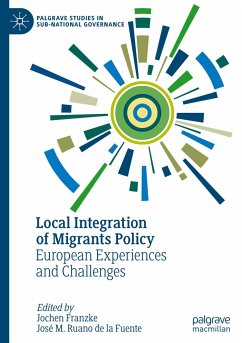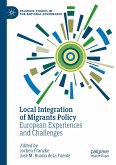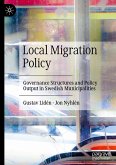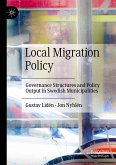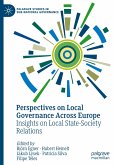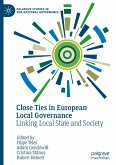Local Integration of Migrants Policy
European Experiences and Challenges
Herausgegeben:Franzke, Jochen; Ruano de la Fuente, José M.
Local Integration of Migrants Policy
European Experiences and Challenges
Herausgegeben:Franzke, Jochen; Ruano de la Fuente, José M.
- Gebundenes Buch
- Merkliste
- Auf die Merkliste
- Bewerten Bewerten
- Teilen
- Produkt teilen
- Produkterinnerung
- Produkterinnerung
This book presents an overview of European migration policy and the various institutional arrangements within and between various actors, such as local councils, local media, local economies, and local civil society initiatives. Both the role of local authorities in this policy field and their cooperation with civil society initiatives or networks are under-explored topics for research. In response, this book provides a range of detailed case studies focusing on the six main groups of national and administrative traditions in Europe: Germanic, Scandinavian, Napoleonic, Southeastern European, Central-Eastern European and Anglo-Saxon.…mehr
Andere Kunden interessierten sich auch für
![Local Integration of Migrants Policy Local Integration of Migrants Policy]() Local Integration of Migrants Policy97,99 €
Local Integration of Migrants Policy97,99 €![Local Migration Policy Local Migration Policy]() Gustav LidénLocal Migration Policy75,99 €
Gustav LidénLocal Migration Policy75,99 €![Local Migration Policy Local Migration Policy]() Gustav LidénLocal Migration Policy75,99 €
Gustav LidénLocal Migration Policy75,99 €![The EU's Policy on the Integration of Migrants The EU's Policy on the Integration of Migrants]() Pierre Georges Van WolleghemThe EU's Policy on the Integration of Migrants60,99 €
Pierre Georges Van WolleghemThe EU's Policy on the Integration of Migrants60,99 €![The EU's Policy on the Integration of Migrants The EU's Policy on the Integration of Migrants]() Pierre Georges Van WolleghemThe EU's Policy on the Integration of Migrants60,99 €
Pierre Georges Van WolleghemThe EU's Policy on the Integration of Migrants60,99 €![Perspectives on Local Governance Across Europe Perspectives on Local Governance Across Europe]() Perspectives on Local Governance Across Europe97,99 €
Perspectives on Local Governance Across Europe97,99 €![Close Ties in European Local Governance Close Ties in European Local Governance]() Close Ties in European Local Governance119,99 €
Close Ties in European Local Governance119,99 €-
-
-
This book presents an overview of European migration policy and the various institutional arrangements within and between various actors, such as local councils, local media, local economies, and local civil society initiatives. Both the role of local authorities in this policy field and their cooperation with civil society initiatives or networks are under-explored topics for research. In response, this book provides a range of detailed case studies focusing on the six main groups of national and administrative traditions in Europe: Germanic, Scandinavian, Napoleonic, Southeastern European, Central-Eastern European and Anglo-Saxon.
Produktdetails
- Produktdetails
- Palgrave Studies in Sub-National Governance
- Verlag: Palgrave Macmillan / Springer International Publishing / Springer, Berlin
- Artikelnr. des Verlages: 978-3-030-50978-1
- 1st edition 2021
- Seitenzahl: 376
- Erscheinungstermin: 28. November 2020
- Englisch
- Abmessung: 216mm x 153mm x 25mm
- Gewicht: 575g
- ISBN-13: 9783030509781
- ISBN-10: 3030509788
- Artikelnr.: 59444222
- Herstellerkennzeichnung
- Springer-Verlag GmbH
- Tiergartenstr. 17
- 69121 Heidelberg
- ProductSafety@springernature.com
- Palgrave Studies in Sub-National Governance
- Verlag: Palgrave Macmillan / Springer International Publishing / Springer, Berlin
- Artikelnr. des Verlages: 978-3-030-50978-1
- 1st edition 2021
- Seitenzahl: 376
- Erscheinungstermin: 28. November 2020
- Englisch
- Abmessung: 216mm x 153mm x 25mm
- Gewicht: 575g
- ISBN-13: 9783030509781
- ISBN-10: 3030509788
- Artikelnr.: 59444222
- Herstellerkennzeichnung
- Springer-Verlag GmbH
- Tiergartenstr. 17
- 69121 Heidelberg
- ProductSafety@springernature.com
Jochen Franzke is a Professor of Administrative Science at the Faculty of Economics and Social Science, University of Potsdam, Germany. His main research fields are comparative sub-national public administrative reforms and new forms of local governance and citizen participation. He is a member of the Board of the Institute of Local Government Studies (University of Potsdam) and Co-chair of the Permanent Study Group on Local Governance and Democracy at the European Group of Public Administration (EGPA). He has been a visiting scholar at several European universities. José M. Ruano de la Fuente is a Professor at the Complutense University of Madrid (UCM), Spain, and has been a visiting scholar at several European and American universities. His main research fields are comparative public administration and local governance. Currently, he is Vice-President of the European association Entretiens Universitaires Réguliers pour l'Administration en Europe (EUROPA), President of its Scientific Committee, and Co-chair of the Permanent Study Group on Local Governance and Democracy at the European Group of Public Administration (EGPA). He is Co-editor of The Palgrave Handbook of Decentralisation in Europe.
Chapter 1: Introduction.- Chapter 2: Between Central Control and Local Autonomy - the Changing Role of Swedish Municipalities in the Implementation of Integration Policies.- Chapter 3: The Norwegian case. Integration through local autonomy and institutionalization.- Chapter 4: Finland's immigration policy: state objectives, local solutions.- Chapter 5: The Swiss Rationale of Integration Policies: Balancing Federalism, Consociationalism and Direct Democracy.- Chapter 6: Threats and opportunities from Dutch migration.- Chapter 7: Germany: From Denied Immigration to Integration of Migrants.- Chapter 8: Irelands evolving migrant policy: recurring rhetoric, sporadic action.- Chapter 9: Reception of Asylum Seekers and Refugees in France: Between Rigour and Humanism.- Chapter 10: Immigration and integration policies in Poland: institutional, political and social perspectives.- Chapter 11: Slovenian migration management at the local level.- Chapter 12: Local integration policy of migrants in Croatia: In search of coherence and capacity.- Chapter 13: Romania's Policy of Migration and Integration: Unattractive Host Nation and Alternative Transit Route.- Chapter 14: Challenges of Immigrant Integration in Spanish Local Governments.- Chapter 15: Internal Geopolitics and Migration Policies in Italy.- Chapter 16: Public opinion on migration and the role of the media in the context of the "European refugee crisis".- Chapter 17: Integrating immigrants. Capacities and Challenges for Local Authorities in Europe.- Chapter 18: Conclusion and Outlook.
Chapter 1: Introduction.- Chapter 2: Between Central Control and Local Autonomy - the Changing Role of Swedish Municipalities in the Implementation of Integration Policies.- Chapter 3: The Norwegian case. Integration through local autonomy and institutionalization.- Chapter 4: Finland's immigration policy: state objectives, local solutions.- Chapter 5: The Swiss Rationale of Integration Policies: Balancing Federalism, Consociationalism and Direct Democracy.- Chapter 6: Threats and opportunities from Dutch migration.- Chapter 7: Germany: From Denied Immigration to Integration of Migrants.- Chapter 8: Irelands evolving migrant policy: recurring rhetoric, sporadic action.- Chapter 9: Reception of Asylum Seekers and Refugees in France: Between Rigour and Humanism.- Chapter 10: Immigration and integration policies in Poland: institutional, political and social perspectives.- Chapter 11: Slovenian migration management at the local level.- Chapter 12: Local integration policy of migrants in Croatia: In search of coherence and capacity.- Chapter 13: Romania's Policy of Migration and Integration: Unattractive Host Nation and Alternative Transit Route.- Chapter 14: Challenges of Immigrant Integration in Spanish Local Governments.- Chapter 15: Internal Geopolitics and Migration Policies in Italy.- Chapter 16: Public opinion on migration and the role of the media in the context of the "European refugee crisis".- Chapter 17: Integrating immigrants. Capacities and Challenges for Local Authorities in Europe.- Chapter 18: Conclusion and Outlook.

